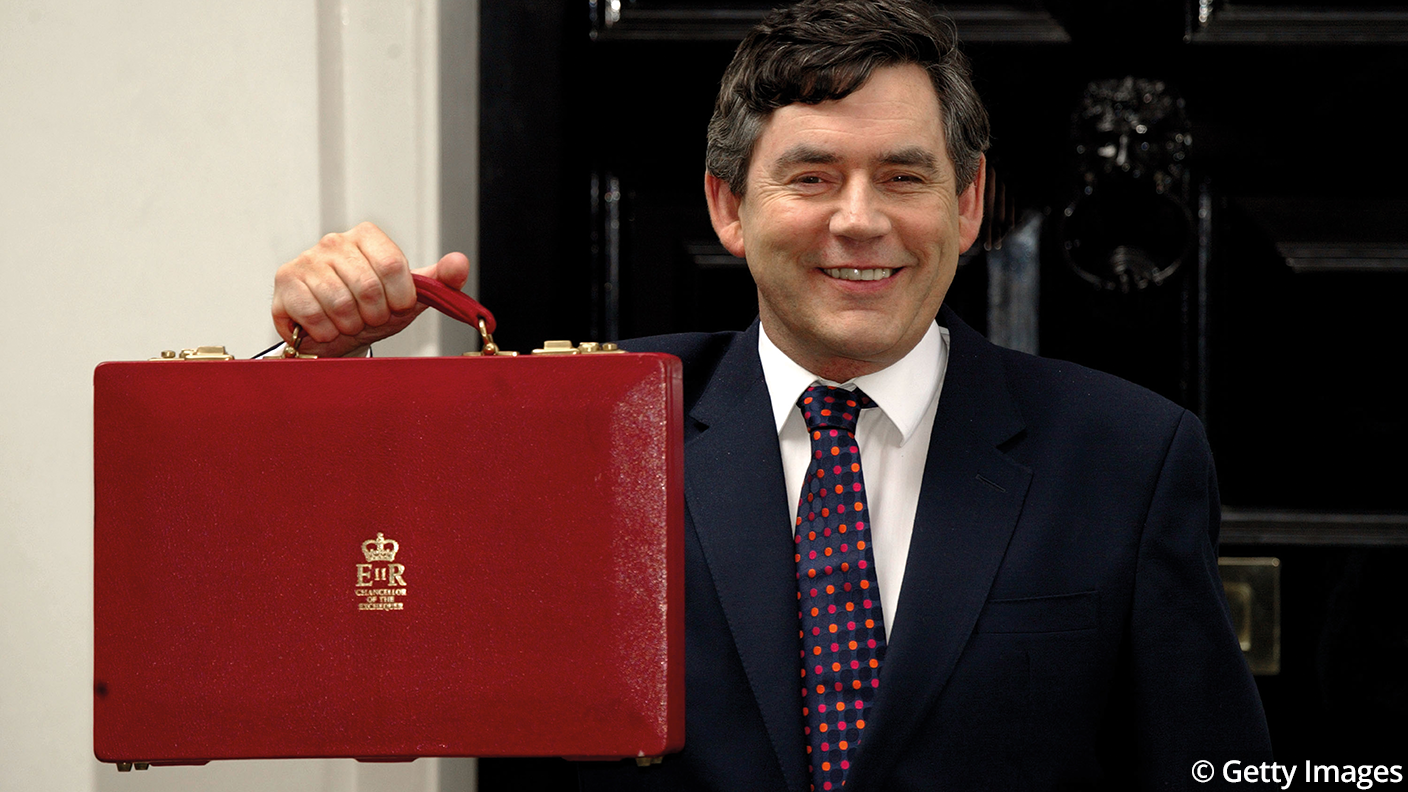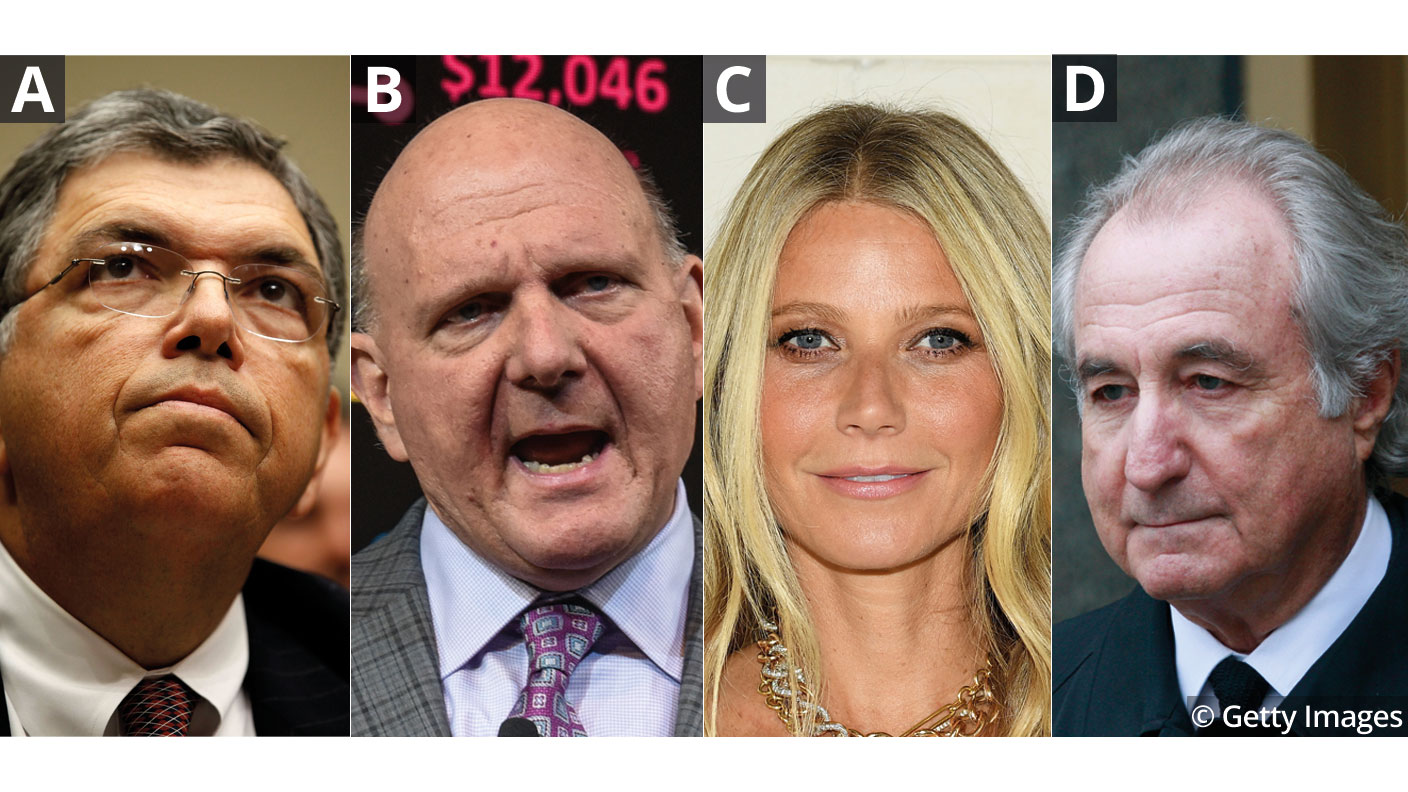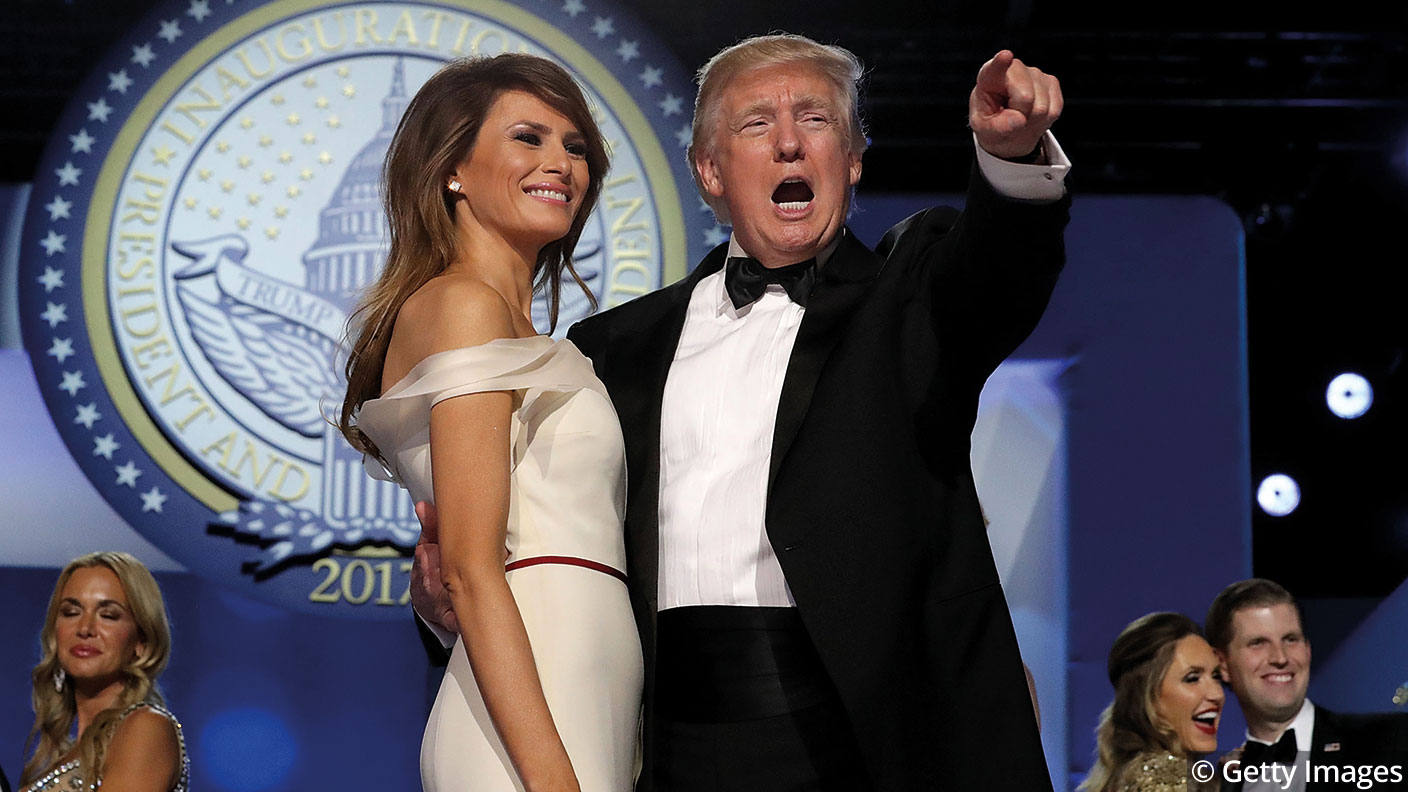MoneyWeek 1,000: Quiz of the last 20 years
MoneyWeek launched in November 2000 amid the dotcom bust and the pace hasn’t let up since. Test your recall of the biggest market events of the past two decades with our quiz. Compiled by Jasper Spires

Get the latest financial news, insights and expert analysis from our award-winning MoneyWeek team, to help you understand what really matters when it comes to your finances.
You are now subscribed
Your newsletter sign-up was successful
Want to add more newsletters?

Twice daily
MoneyWeek
Get the latest financial news, insights and expert analysis from our award-winning MoneyWeek team, to help you understand what really matters when it comes to your finances.

Four times a week
Look After My Bills
Sign up to our free money-saving newsletter, filled with the latest news and expert advice to help you find the best tips and deals for managing your bills. Start saving today!
Money
1. In 2015, which central bank became the world’s first to turn its main interest rate negative?
A. Danmarks Nationalbank (Denmark)
B. The Bank of Japan
MoneyWeek
Subscribe to MoneyWeek today and get your first six magazine issues absolutely FREE

Sign up to Money Morning
Don't miss the latest investment and personal finances news, market analysis, plus money-saving tips with our free twice-daily newsletter
Don't miss the latest investment and personal finances news, market analysis, plus money-saving tips with our free twice-daily newsletter
C. Sveriges Riksbank (Sweden)
2. In 2009, what nasty surprise did Greece reveal, one that would eventually take the eurozone to the brink?
A. A budget deficit roughly twice as large as expected
B. A huge state-backed investment in US mortgage debt
C. A plan to vote on bringing back the drachma

3. In 2002, then-chancellor Gordon Brown finished a three-year process of selling Britain’s gold reserves, for an average price of $275 per ounce over the period. What proportion of our reserves did he sell?
A. About a tenth
B. A quarter
C. More than half
4. Which country’s inflation rate has exceeded 50,000,000% in the last four years?
A. Zimbabwe
B. Venezuela
C. Sudan
5. Today, one bitcoin is worth around $10,000. In May 2010, Laszlo Hanyecz shelled out 10,000.99 bitcoins for what?
A. Two pizzas from Papa John’s
B. A gold sovereign
C. A McDonald’s Happy Meal
6. In 2017, with debt markets buoyant, Argentina sold $2.75bn-worth of 100-year government bonds. If it defaults on those, as seems likely, this will be the ninth time that it has defaulted on its sovereign debt. But which country has defaulted on its debt most often?
7. In 2019, central banks stopped issuing and distributing one of the most valuable paper banknotes in the world, ostensibly due to concerns about its use by criminals (although it remains legal tender). Which note is it?
8. In 2007, the pound hit its highest level against the US dollar during the last 20 years. How high did it get?
A. $2.11; B. $1.82; C. $1.74
9. On 6 March 2009 the US benchmark index, the S&P 500, reached its rock bottom for the financial crisis. But what creepy number was the absolute nadir?
10. In September 2007, which bank rather unexpectedly became the safest bank in the UK, and why?
People
1. Which catchphrase, coined in 2012, is former European Central Bank governor Mario Draghi arguably most famous for ad-libbing?
A. “Do you feel lucky?”
B. “Whatever it takes.”
C. “Be greedy when others are fearful.”
2. Which investor became infamous in 2015 for raising the price of the parasite medication Daraprim from $13.50 to $750 a tablet? That same year, he also paid $2m for the sole copy of US rap group Wu Tang Clan’s Once Upon A Time In Shaolin album.
3. In 2005, Dennis Kozlowski was convicted of committing fraud during his time as chief executive of Tyco International. What particular item of furnishing made him infamous as a symbol of corporate excess?
A. Golden shower curtains
B. A silver dog kennel
C. A platinum umbrella stand
4. Which book by Michael Lewis told the story of the 2008 financial crash and was turned into a Hollywood film starring Christian Bale and Steve Carell as hedge fund managers?
5. In 2008, Bernie Madoff was arrested in New York for running a massive Ponzi scheme. Which of the following statements about him is untrue?
A. In 1999, financial analyst Harry Markopolos warned the US regulator, the SEC, that Madoff was a fraud.
B. Madoff was chairman of the Nasdaq in the early 1990s.
C. Madoff has been played by Richard Dreyfuss, Robert De Niro and Alec Baldwin in TV dramas based on his life.
6. At his current rate of wealth accumulation, Jeff Bezos, the founder of Amazon, is on track to become the world’s first trillionaire by 2026, according to an estimate by US software review site Comparisun. But how much – to the nearest $10bn – is he worth now?
A. About $140bn to $150bn
B. About $250bn to $260bn
C. Just under $500bn
7. Who became the world’s youngest self-made female billionaire in 2014, according to Forbes magazine, and then by 2016, lost it all, also according to Forbes?
8. In 2018, Tesla founder Elon Musk got into trouble for tweeting that he had “funding secured” to take the electric-car company private. But at what price per share?
9. Disgraced fund manager Neil Woodford used phones with specially-designed recording functions so that he could trade while doing what?
10. Which former bank chief executive was so tidiness-obsessed that he ordered custom-made filing cabinets with rounded tops for his offices to prevent people from leaving paper on them?
Quotes: put the words with the person who said them

1. “I am a good person.”
2. “When the music stops, in terms of liquidity, things will be complicated. But as long as the music is playing, you’ve got to get up and dance. We’re still dancing.”
3. “There’s no chance that the iPhone is going to get any significant market share. No chance.”
4. “I am who I am. I can’t pretend to be somebody who makes $25,000 a year.”
Companies
1. In 2002, the Big Five became the Big Four when accounting firm Arthur Andersen collapsed. The demise of which company was responsible for its downfall?
2. Apple is widely credited for kicking off the smartphone boom in 2007 with the first iPhone. However, which mobile-phone group has enjoyed the greatest market share for the past decade?
A. Samsung; B. Apple; C. Nokia
3. Which popular Aim stock shocked investors when it abruptly revealed a huge black hole in its accounts in 2018?
4. Which carmaker hit a massive pothole in 2015 when US regulators found that it had intentionally cheated on engine emissions tests?
5. In 2003, supermarket chain Wm Morrison took over which rival, in a move that left the acquirer struggling with indigestion for several years?
6. Marks & Spencer currently trades at around 86p a share. In 2004, retail tycoon Philip Green made a takeover bid for the company at what level?
A. £2 a share
B. £4 a share
C. 40p a share
7. In 2010, the Deepwater Horizon oil spill in the Gulf of Mexico killed 11 people and nearly brought down oil major BP. Which careless comment made in the wake of the disaster arguably cost chief executive Tony Hayward his job?
8. As of February 2020, which single company holds the greatest market share in cloud computing services?
A. Microsoft Azure
B. Google Cloud
C. Amazon Web Services
9. Two of these companies were genuine dotcom-era firms and the other is made up. Which is the odd one out?
A. Pets.com
B. Webvan
C. Caddy.shack
10. In 2019, trendy office space provider WeWork was set to go public with a hoped-for valuation of $47bn. The listing was pulled after investors baulked at the prospectus. What is WeWork valued at now (at least, according to its largest shareholder, SoftBank)?
A. $2.9bn; B. $0.4bn;
C. $12.3bn
Markets
1. By roughly how much did daily US oil production rise between November 2000 and the start of this year?
2. What was crude oil’s highest price per barrel in the last 20 years (as measured by the Brent benchmark)?
A. $110
B. $148
C. $165

3. “If the question is when markets will recover, a first-pass answer is never.” That was Nobel prize-winning economist Paul Krugman, commenting in The New York Times on the morning of Donald Trump’s election victory in November 2016. What has happened to the S&P 500, the US benchmark index, since then?
A. It’s fallen by about 35%
B. It’s risen by about 35%
C. It’s stayed the same
4. In which year was platinum last consistently worth more than gold?
5. Since MoneyWeek launched in November 2000, what’s the highest the Bank of England’s key interest rate has been?
6. According to Nationwide, which of the last three decades saw the weakest house-price growth across the UK?
A. 2010s
B. 2000s
C. 1990s
7. In November 2000, the global market value of bonds priced at negative yields (in other words, where the lender pays to lend to the borrower) was $0. In August 2019, it hit a record level of around 20% of global GDP. How much is that?
A. $4trn
B. $11trn
C. $17trn
8. Between March 2009 and March this year, the US benchmark index, the S&P 500, recorded its longest bull market in history – that is, the longest period without a drop of 20% or more. What boom period previously held the record?
9. Ignoring dividends, by how much has the FTSE 100 risen since early November 2000?
10. In 2000, passive investments accounted for a negligible portion of UK assets under management. What percentage do they account for now?
A. 14%
B. 26%
C. 52%
ANSWERS
Money
1. C.
2. A.
3. C.
4. B.
5. A.
6. Spain, which has defaulted at least 13 times. 7. The €500 note. 8. A. 9. 666 10. Northern Rock. To halt a run on the bank, the government promised to guarantee 100% of any savings, rather than the-then FSCS limit of 100% of £2,000, plus 90% of the next £33,000.
People
1. B.
2. Martin Shkreli.
3. A.
4.The Big Short.
5. C. De Niro and Dreyfuss each played Madoff in biopics, whereas Baldwin’s fictional character in Blue Jasmine was only loosely inspired by Madoff.
6. A.
7. Elizabeth Holmes, founder of defunct blood-testing company Theranos .
8. $420.
9. Horse riding.
10. Fred Goodwin of RBS
Quotes
1 D: Bernie Madoff (interview from prison in 2011, with Steve Fishman of New York magazine)
2 A: Chuck Prince (Citi’s ex-CEO, FT interview, July 2007)
3 B: Steve Ballmer (ex-CEO of Microsoft, April 2007)
4 C: Gwyneth Paltrow, Elle, 2009
Companies
1. Energy giant Enron.
2. A.
3. Patisserie Valerie
4. Volkswagen.
5. Safeway
6. B.
7. “I’d like my life back.”
8. C. 9. C.
10. A.
Markets
1. It more than doubled, from just under six million barrels a day to around 13 million.
2. B.
3. B.
4. 2014. The platinum price fell below that of gold in early 2015 and has consistently been worth less since.
5. 6%. It was raised to 6% in February 2000, then cut to 5.75% in February 2001.
6. C: The 1990s, at 21%. It was 117% in the 2000s, and 33% in the 2010s.
7. C.
8. October 1990 to March 2000
9. Trick question: as of 19 May, the FTSE is about 5% lower.
10. B (as of 2018).
Get the latest financial news, insights and expert analysis from our award-winning MoneyWeek team, to help you understand what really matters when it comes to your finances.
Jasper is a former writer for the MoneyWeek and he wrote on an array of topics including travel, investing in crypto and bitcoin, as well as cars. Previous to that he freelanced at The Art Newspaper, PORT Magazine and The Spectator. Jasper is currently a freelance writer at FAD magazine and he has an English literature degree from the University of Exeter, and a Master's degree from UCL.
-
 Should you buy an active ETF?
Should you buy an active ETF?ETFs are often mischaracterised as passive products, but they can be a convenient way to add active management to your portfolio
-
 Power up your pension before 5 April – easy ways to save before the tax year end
Power up your pension before 5 April – easy ways to save before the tax year endWith the end of the tax year looming, pension savers currently have a window to review and maximise what’s going into their retirement funds – we look at how
-
 UK wages grow at a record pace
UK wages grow at a record paceThe latest UK wages data will add pressure on the BoE to push interest rates even higher.
-
 Trapped in a time of zombie government
Trapped in a time of zombie governmentIt’s not just companies that are eking out an existence, says Max King. The state is in the twilight zone too.
-
 America is in deep denial over debt
America is in deep denial over debtThe downgrade in America’s credit rating was much criticised by the US government, says Alex Rankine. But was it a long time coming?
-
 UK economy avoids stagnation with surprise growth
UK economy avoids stagnation with surprise growthGross domestic product increased by 0.2% in the second quarter and by 0.5% in June
-
 Bank of England raises interest rates to 5.25%
Bank of England raises interest rates to 5.25%The Bank has hiked rates from 5% to 5.25%, marking the 14th increase in a row. We explain what it means for savers and homeowners - and whether more rate rises are on the horizon
-
 UK inflation remains at 8.7% ‒ what it means for your money
UK inflation remains at 8.7% ‒ what it means for your moneyInflation was unmoved at 8.7% in the 12 months to May. What does this ‘sticky’ rate of inflation mean for your money?
-
 Would a food price cap actually work?
Would a food price cap actually work?Analysis The government is discussing plans to cap the prices of essentials. But could this intervention do more harm than good?
-
 Is my pay keeping up with inflation?
Is my pay keeping up with inflation?Analysis High inflation means take home pay is being eroded in real terms. An online calculator reveals the pay rise you need to match the rising cost of living - and how much worse off you are without it.
